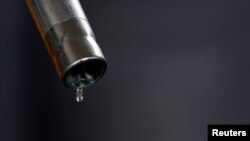On December 1st, five West African countries agreed to stop importing “dirty” fuel from Europe.
Dirty fuel is the name for diesel fuel that has a high amount of sulfur.
Nigeria, Benin, Togo, Ghana, and Ivory Coast will join seven other African countries that have already suspended imports of the product.
The imports will not stop immediately. Ghana plans to halt them in March 2017. The other countries will stop accepting dirty diesel next July.
Pollution and Health Problems
Emissions from dirty fuel make air pollution worse. The emissions also may be partly to blame for health problems. Studies have linked them to asthma, lung cancer, and stroke.
Millions of deaths every year are blamed on air pollution. Health officials say children are especially likely to be hurt by poor air quality.
United Nations, or U.N. officials have praised the new agreement. But they say that Africa has a long way to go to meet air quality rules in other areas.
Jane Akumu works on transport issues for the U.N. Environment Programme.
She explains that diesel emissions, especially from large vehicles, help create black carbon – the second most important climate pollutant. Black carbon comes from the incomplete burning of oil or other fossil fuels.
Europe, Akumu adds, now uses cleaner diesel. But some traders are able to sell dirty diesel to Africa by mixing it with other fuels with higher sulfur levels. Much of the dirty fuel exported to Africa is said to come from The Netherlands.
Future plans for cutting emissions
Three countries in Southern Africa could agree to ban dirty diesel next year.
Akumu says low-sulfur diesel fuels should not cost more than other fuels. Even with progress being made, she adds, there is still more work to be done:
"I think the next step would be to look at the kind of vehicles that are coming into these countries. So, we've been partnering with countries to introduce cleaner fuel. But the ultimate objective is actually to combine the cleaner fuels and the cleaner vehicles to have vehicle emission standards, which are still lacking in Africa."
Akumu notes that Africa imports many older, used vehicles. The average age of a car in Ghana, she says, is 14 years.
According to U.N. Environment, "A combination of low sulfur fuels with advanced vehicle standards can reduce harmful emissions by vehicles by as much as 90 percent."
I'm John Russell.
Joe De Capua wrote this story for VOANews.com. John Russell adapted his report for Learning English. George Grow was the editor.
_____________________________________________________________
Words in This Story
sulfur – n. a yellow chemical element that has a strong, unpleasant odor when it is burned and that is used in making paper, gunpowder, medicine, etc.
emission – n. the act of producing or sending out something (such as energy or gas) from a source
incomplete – adj. not complete
introduce – v. to bring into play; to lead or bring in, usually for the first time
standard – n. something set up as a rule for the measure of quality, amount of value




